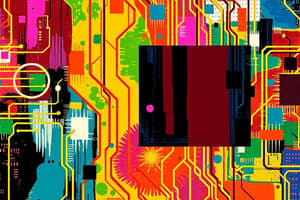Podcast
Questions and Answers
Define memory.
Define memory.
Memory is learning that persists over time. Its ability to store and retrieve information.
Where is implicit memory processed in the brain? Explicit memory?
Where is implicit memory processed in the brain? Explicit memory?
Implicit memory is processed partly by the cerebellum, while explicit memory is processed in the hippocampus.
Define procedural memory.
Define procedural memory.
Define episodic memory.
Define episodic memory.
Define implicit memory.
Define implicit memory.
Define explicit memory.
Define explicit memory.
Define declarative memory.
Define declarative memory.
Define semantic memory.
Define semantic memory.
Understand the three different memory stores and know how they differ in terms of duration and capacity.
Understand the three different memory stores and know how they differ in terms of duration and capacity.
Understand the constructed nature of memory, including misinformation effects and imagination effects.
Understand the constructed nature of memory, including misinformation effects and imagination effects.
Know what automatic and effortful processing are, and the difference between them.
Know what automatic and effortful processing are, and the difference between them.
Understand context effects, and identify an example.
Understand context effects, and identify an example.
Know the best rehearsal strategies for increasing long-term recall of information.
Know the best rehearsal strategies for increasing long-term recall of information.
Understand how stress hormones influence the encoding of traumatic events and the details surrounding them.
Understand how stress hormones influence the encoding of traumatic events and the details surrounding them.
Distinguish between recognition and recall. Recognize faster re-learning as an indication of memory.
Distinguish between recognition and recall. Recognize faster re-learning as an indication of memory.
Understand the principle of mood congruent memory.
Understand the principle of mood congruent memory.
Flashcards are hidden until you start studying
Study Notes
Definition of Memory
- Memory is the ability to learn and retain information over time.
- Key indicators include recall, recognition, and relearning.
Types of Memory
-
Explicit Memory
- Involves facts and experiences that can be consciously declared.
- Processed primarily in the hippocampus.
-
Implicit Memory
- Involves skills and actions learned without conscious awareness (nondeclarative memory).
- Partly processed in the cerebellum.
-
Procedural Memory
- Relates to performance of actions and skills without conscious thought.
-
Episodic Memory
- Explicit memory for personally experienced events.
- One of two conscious memory systems, alongside semantic memory.
-
Semantic Memory
- Explicit memory for facts and general knowledge.
- Represents the second conscious memory system.
Memory Stores
-
Sensory Memory
- Immediate and brief recording of sensory information.
-
Working Memory
- Short-term memory that involves active processing of incoming information and retrieval from long-term memory.
-
Long-Term Memory
- Relatively permanent storehouse for knowledge, skills, and experiences with virtually limitless capacity.
Memory Construction and Misinformation
- Memory can be reconstructed; missing pieces may be filled in for coherence.
- Misinformation Effect: Incorporating inaccurate details into one's memory.
- Imagination Effect: Repeatedly imagining non-existent events can lead to false memories.
Encoding Processes
-
Automatic Processing
- Unconscious encoding of incidental information and well-learned material.
-
Effortful Processing
- Requires conscious attention and effort.
Context Effects
- Recall improves when in the same context as the original learning.
- Example: Scuba divers recall words better underwater if learned underwater.
Rehearsal Strategies for Long-Term Recall
- Repeated studying enhances long-term retention.
- Active engagement and personal relevance improve memory.
- Use mnemonic devices and chunking for better encoding.
- Employ retrieval cues to recreate the learning context.
- Recall fresh information before exposure to misinformation.
- Reduce interference by testing and identifying gaps in knowledge.
Stress and Memory Encoding
- Heightened emotions can enhance memory formation.
- Flashbulb memories are vivid recollections of emotionally significant events.
Recognition vs. Recall
- Recognition: Identifying previously learned information (e.g., multiple-choice tests).
- Recall: Retrieving information from long-term memory without cues (e.g., fill-in-the-blank tests).
- Relearning: The speed of reacquiring information indicates memory strength.
Mood Congruent Memory
- Recollection of experiences that align with an individual's current mood, influencing the retrieval of memories consistent with emotional state.
Studying That Suits You
Use AI to generate personalized quizzes and flashcards to suit your learning preferences.




